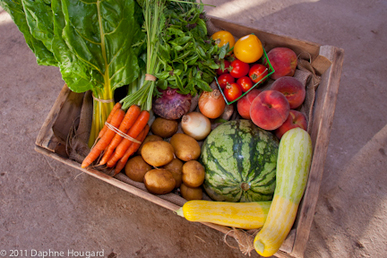
One friend had just returned from an island vacation with her extended family. She agreed with the concept of the food revolution being more of a social movement and liked the idea of creating more food hubs to help organic farmers get their food to like-minded markets and finding ways to preserve farmland and get more people farming. "That is all well and good," she said, "but how do you broach the sustainable food subject with friends and relatives who either don't see or care about the value of our food?"
People want to buy their Wish-Bone salad dressings and Gogurts. They are familiar, cheap and convenient products. It can be a touchy conversation and one you want to go well so you both feel happy with the outcome. I've thought about this conundrum many times thinking how we need a set of communication tools and tips to help convince friends and relatives respectfully but swiftly. We can't be judgmental in our approach because people will turn off but we also need to start seeing light bulbs go off at a faster pace than they are currently in order to increase the groundswell for a healthier tomorrow. Times a tickin! If you've got ideas, send'em my way. Please!
Most people will agree that pesticides are bad and chickens should have room to roam but they still buy chemically drenched veggies and factory farm eggs. Why is that? For one, they don't see the direct connection to the food they are eating. It's not like they are picking the eggs up at a confined animal feeding operation (CAFO) and see the conditions in which their food was raised. But the bigger reason is...Price! We are a price driven society. And even though food is one of life's three basic building blocks along with water and air, we want food to be cheap. But we will pay high prices for other consumer goods like fashion, electronics and toys. If we measured status by what we ate and not how we looked, the tables would be turned. We need to view ourselves not as consumers but as eaters (just learned this concept in the book I'm reading entitled, Farmer Jane).
Bottom line, food needs to be a priority. We make our children a priority. The food we feed them and where it comes from should be a priority. Once upon a time, we use to spend 25% of our salaries on food now it is less than 10%. If we reprioritized our buying habits, we would spend less on dressing our lives and more on nourishing our families. And if worried about price, then we should find ways to not waste so much. 40% of the food produced in the US gets thrown away either before it reaches the market, at the market or in our homes. If we shopped more consciously, we would throw less food away in our homes leaving more money to buy food grown sustainably.

 RSS Feed
RSS Feed
